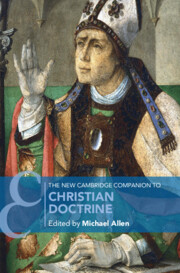Book contents
- The New Cambridge Companion to Christian Doctrine
- Cambridge Companions to Religion
- The New Cambridge Companion to Christian Doctrine
- Copyright page
- Contents
- Contributors
- Preface
- Part I Doctrines
- Part II Movements
- 11 Feminist Theology
- 12 Theological Interpretation of Scripture
- 13 Radical Orthodoxy
- 14 Public Theology
- 15 Disability Theology
- 16 Black Theology
- 17 Pentecostal Theology
- 18 Analytic Theology
- 19 Apocalyptic Theology
- 20 Reformed Catholicity
- 21 Ressourcement Thomism
- Index
- Cambridge Companions to Religion (continued from page iii)
- References
13 - Radical Orthodoxy
from Part II - Movements
Published online by Cambridge University Press: 03 November 2022
- The New Cambridge Companion to Christian Doctrine
- Cambridge Companions to Religion
- The New Cambridge Companion to Christian Doctrine
- Copyright page
- Contents
- Contributors
- Preface
- Part I Doctrines
- Part II Movements
- 11 Feminist Theology
- 12 Theological Interpretation of Scripture
- 13 Radical Orthodoxy
- 14 Public Theology
- 15 Disability Theology
- 16 Black Theology
- 17 Pentecostal Theology
- 18 Analytic Theology
- 19 Apocalyptic Theology
- 20 Reformed Catholicity
- 21 Ressourcement Thomism
- Index
- Cambridge Companions to Religion (continued from page iii)
- References
Summary
The theological movement known as Radical Orthodoxy arose in the late 1990s as a small group of University lecturers and research students who met for seminars, to discuss papers responding to various cultural and philosophico-theological circumstances. What began as a small discussion group gradually expanded into a variegated network of scholars whose views were not always aligned with one another but who shared a commitment to exploring the value of pre-modern metaphysics in problematising contemporary philosophical and theological questions. The movement is not a singular edifice comprising individuals of the same opinion in all matters but has been described as a theological idiolect or style of approach, constructive and critical at once. In what follows, I will outline the cultural and theological context in which the movement arose and then enumerate the central characteristics of a ‘radically orthodox’ approach, insofar as that may be singularly identified, before suggesting areas for future development.
- Type
- Chapter
- Information
- The New Cambridge Companion to Christian Doctrine , pp. 212 - 230Publisher: Cambridge University PressPrint publication year: 2022



